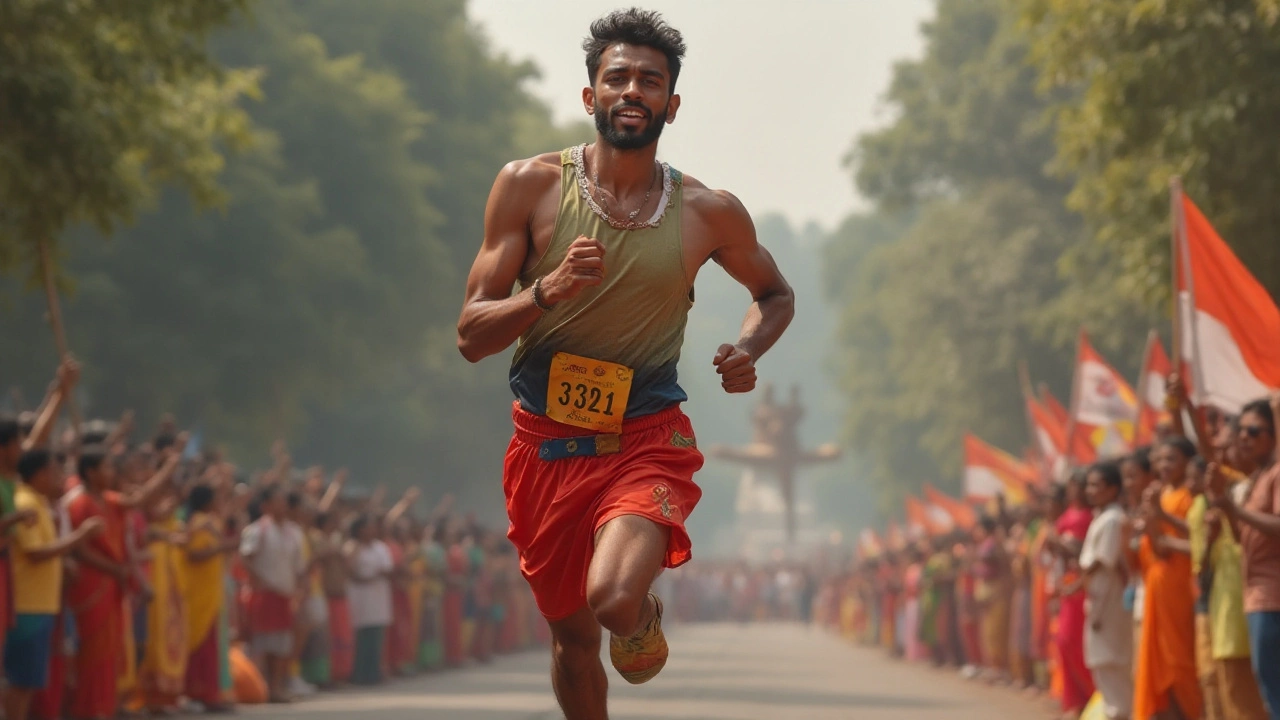You’ve probably heard whispers in the community of an epic adventure—the marathon. This 26.2-mile journey demands not just physical prowess, but an ironclad spirit. Can just anyone take to the starting line and cross the coveted finish? Let's find out!
Running a marathon is not just for those with a natural talent for running. The average individual, with true grit and some proper preparation, can certainly rise to the challenge. But before you lace up those sneakers, let’s explore the essential building blocks required to conquer one of the ultimate tests of endurance.
- The Myth of Natural Born Runners
- Building a Solid Training Plan
- Nutrition and Recovery Tips
- Mental Preparation and Stamina
The Myth of Natural Born Runners
When it comes to running a marathon, there's a common belief that one needs to be naturally blessed with the athletic prowess to even consider attempting it. But let’s park this myth for a moment and take a closer look at the reality. The notion of the 'natural born runner' might be compelling, yet evidence suggests it's more about nurture than nature. Indeed, studies indicate that while genetics do play a role in a person’s potential to excel in endurance sports, the influence of dedication, training, and a positive mental attitude is far greater. Such findings open marathons, once considered the holy grail of endurance events, to the average person who is willing to put in the work and embrace a structured training regime.
The world of marathon training has seen countless stories of seemingly ordinary folks taking on extraordinary feats, proving time and again that it’s not about how your genes are arranged, but about how you arrange your schedule to fit in your runs, stretching, and recovery. For instance, Dr. Yannis Pitsiladis, a renowned sports scientist, argues that "genetics can only take you so far... hard work and persistence are the true key players." This belief is echoed by marathoners around the globe, many of whom started with no running background yet completed multiple marathons in the span of just a few years.
Let’s take a trip back to 1960 when an Ethiopian named Abebe Bikila won the Olympic marathon barefoot. It wasn’t his genetic makeup that won him the gold, but his discipline and determination. This historic event underscores the fact that your starting point doesn’t dictate the outcome. Instead, it’s the journey and the choices you make along the way that matter. Modern marathoners often look back to Bikila as an inspiration, a reminder that with strategy and heart, anyone can cross that finish line.
Of course, it would be remiss not to acknowledge that different individuals have varying baseline capabilities. Some might be able to endure longer distances with little training, while others have to claw their way through every mile. However, the beauty of a marathon lies in its inclusivity; it's less about speed and more about the personal victory. Training plans tailored to suit various skill levels are readily available, making the race accessible to a legion of aspiring runners. It encourages a collective spirit, a vibrant tapestry of dedicated souls pushing boundaries together.
Here’s an encouraging fact: according to a survey done by Runner’s World, nearly 80% of marathon finishers felt more confident after completing a marathon. It’s a testament to the profound impact of stepping up to the marathon plate, an assurance that effort, preparation, and a touch of audacity can turn the dream of running 26.2 miles into reality. In this epic pursuit, the average person is not alone; they are in the company of thousands around the world who have dared to dream and redefine their limits.

Building a Solid Training Plan
Embarking on a journey to complete a marathon begins with the right marathon training plan tailored for success. And just like any grand venture, it's crucial to start with a structured foundation. Creating a training schedule isn't just about running miles; it's about forging a new lifestyle that balances running with rest and nutrition. Many experts suggest starting your preparation 16 to 20 weeks before race day. This timeline allows for a gradual increase in mileage, ensuring your body adapts well to greater distances. Consistency is key, so commit to regular runs, typically 3 to 5 times a week. Mixing short, easy-paced runs with longer, steady ones forms the backbone of your weekly routine. Cross-training activities such as swimming or cycling can offer variety, reducing the risk of burnout while fortifying other muscle groups.
As your training progresses, emphasis should be placed on the weekly long run. These outings build both stamina and mental resilience, proving crucial on race day. Begin at a distance that is comfortable yet challenging. Each week, aim to increase your longest run by approximately a mile, allowing for sufficient rest in between. Around two weeks prior to the marathon, begin your tapering phase, gradually reducing mileage to allow your body ample recovery time.
Include Recovery and Rest
Rest days should not be underestimated within any effective training plan. Providing your muscles with time to recover is essential in preventing injuries like shin splints or tendonitis, which are common among new marathoners. Listening to your body is vital; should discomfort arise that lingers beyond typical muscle soreness, it might be wise to consult a professional. According to renowned coach Hal Higdon, "Recovery delays fatigue, and long-term improvement is impossible without sufficient recuperation between workouts."
- Hal Higdon, Marathon Training Expert
Weekly Breakdown
To gain a clearer picture of how a training week might look, consider the following breakdown:
- Monday: Rest or cross-training (swimming, cycling, yoga)
- Tuesday: Short interval run (4-5 miles, moderate pace)
- Wednesday: Cross-training (strength training or pilates)
- Thursday: Tempo run (5-6 miles, includes warm-up and cool-down)
- Friday: Rest or easy run (3 miles, relaxed pace)
- Saturday: Long run (begin with 8-10 miles, gradually increase)
- Sunday: Active recovery (brisk walk or light stretching)
By meticulously following such a schedule, pacing yourself with intention, and celebrating small victories along the way, an average person can transform their vision of crossing the marathon finish line from dream to reality. Remember, any achievement starts with a single step, and in training for a marathon, each of those steps leads you closer to your own epic accomplishment.

Nutrition and Recovery Tips
When it comes to marathon training, fueling your body properly and allowing adequate recovery can be the difference between crossing the finish line and waving the white flag. One might easily underestimate the importance of nutrition and recovery, but they're pivotal in keeping you on track and injury-free. Your training diet should include a balance of carbohydrates, proteins, and healthy fats to power you through those long inevitable runs. Carbohydrates are the primary source of energy for endurance activities. They effectively replenish glycogen stores in your muscles, so never shy away from pasta or that sweet potato you’ve been eyeing!
Protein, on the other hand, is your muscle’s best friend. It aids in rebuilding muscle fibers that break down during training. Aim to include a source of protein in every meal; this could be as varied as some lean chicken breast or a tasty plant-based lentil stew. Fats should not be overlooked as they provide a dense source of energy and help to absorb vitamins. Healthy options like avocados, nuts, and olive oil can serve you well. Remember, hydration is just as crucial! Water and electrolyte-rich drinks should be your companion during training and on race day as it keeps everything in check.
"Nutrition is one of the most influential pillars of any athlete's training regimen," says acclaimed sports nutritionist Claire Sullivan. "Without the right fuel, your body simply can't perform at its best."
Recovery is Just as Critical
Now, let’s delve into the section often overshadowed by intense training sessions—recovery. To put it succinctly, recovery allows your body to adapt to training and prepares you for future workouts. Post-run recovery should begin within the critical 'golden hour' after completing your workout. This phase is ideal for a replenishing meal and some good stretching. Aim for around a 3:1 carbohydrate-to-protein ratio snack to recharge. Meanwhile, invest time in stretching or foam rolling to alleviate muscle soreness and maintain flexibility. Sleep should not be undercut either, as it is the prime time when your body goes into a repair mode.
Incorporate rest days into your training plan. It’s during these breaks that your body gets stronger, adapting to the cumulative stress of training. Professional runners, though they might seem invincible, still emphasize the importance of downtime and proper sleep. As per research, at least 7-9 hours of slumber each night is optimal for runners. Tools like compression garments, ice baths, or massage are also great additions to a runner’s toolkit, supplementing recovery in soothing ways.

Mental Preparation and Stamina
When it comes to marathon training, the mind is often as important as the muscles. With every mile, you're not just pushing the boundaries of physical endurance; you're also testing the limits of your resolve. Building mental fortitude begins long before race day. It involves practicing visualization, where you imagine yourself crossing the finish line strong and triumphant. This technique is not just a daydream—it's a tool used by elite athletes globally to keep their eyes on the prize. By repeatedly visualizing success, you train your mind to manifest that very reality when it counts. The average person can employ this strategy during training runs to develop an actionable mindset that becomes habit when pushing through the 'wall'—that notorious moment of doubt and fatigue every marathoner faces sooner or later.
Understanding how to harness positive self-talk is another critical step in mastering your mental game. As humans, we often lean towards the negative, so during a marathon, the constant battle against the internal critic can be fierce. Learning to counter thoughts like "I can't do this" with affirmations such as "I'm strong and capable" can boost your performance. Research shows that athletes who engage in positive self-talk perform better, showcasing just how powerful the mind can be in determining outcomes. It's not just about saying the right words to yourself; it's about believing them in the core of your being. Transform self-doubt into confidence by paying attention to those whispers in your mind during each training session.
“The body achieves what the mind believes.” — Napoleon Hill
Moreover, setting tiny, achievable goals throughout the race can help manage the monumental task of finishing. Running a marathon can feel like an insurmountable challenge, especially if you entertain thoughts of finishing while still miles away from the end. Instead, focus on the moment. Break down the race into segments. Set goals like reaching the next aid station or completing the current mile. This strategy not only makes the distance seem less daunting but also provides a sense of accomplishment with each milestone reached. Regularly celebrating these small victories can keep your spirits high and motivate you to keep moving forward. The mental shift from the overwhelming to the manageable is a game changer for many runners.
Training the Mind Through Practice
Preparing mentally for a marathon isn't limited to race day alone; it’s an integral part of training. Regular meditative practices can enhance focus and concentration, lessening distractions on the course. Developing such mindfulness during daily runs can also improve the ability to maintain a rhythm when the going gets tough. Seasoned runners often set aside time for mental workouts, akin to physical training—be it in the form of guided meditation, mental resilience exercises, or breath control techniques known to steady the heart rate and calm the racing mind.
Having a strategy for mental resilience is imperative. The emotional highs and lows throughout a marathon can be significant, but knowing how to ride the wave can make all the difference. Cultivating a support network of fellow runners and friends who understand the journey can provide encouragement when needed. Often, others take inspiration from your readiness to tackle the challenge, reminding you of your reasons for running. Whether it's running for a cause, personal achievement, or love for the sport, never lose sight of these motivations.





